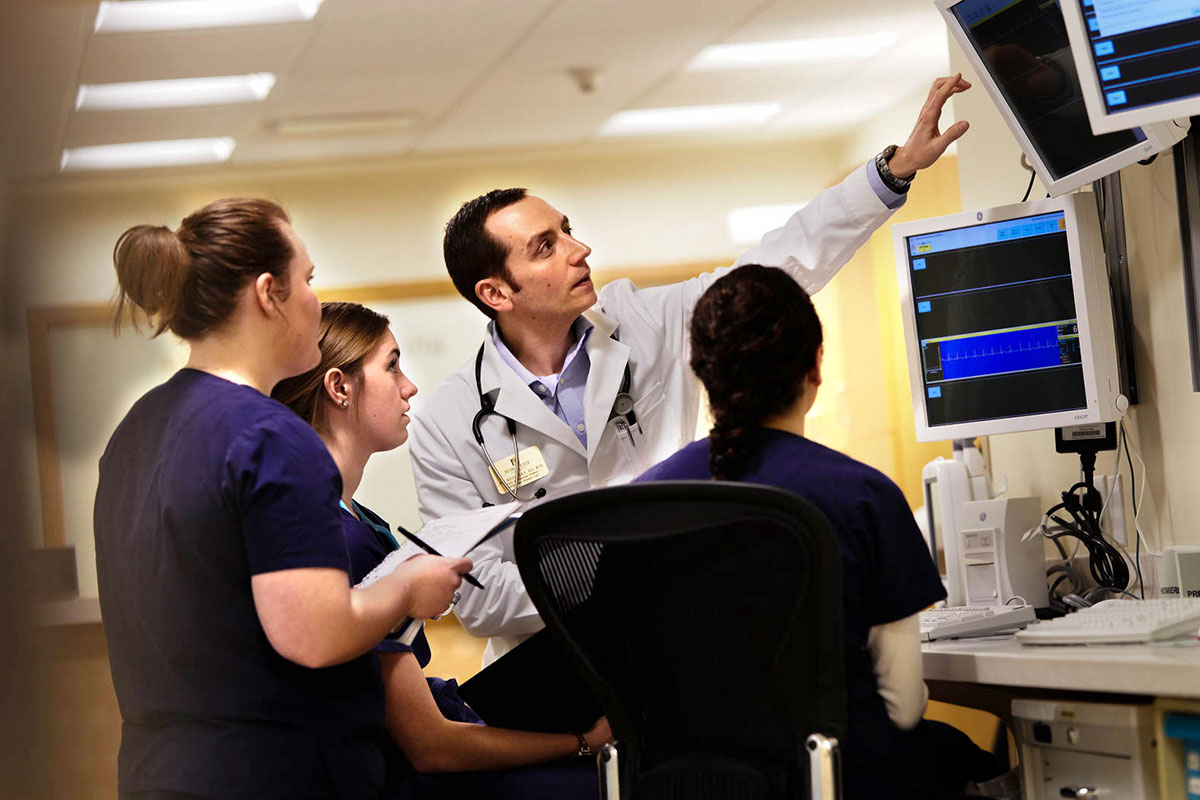
Marquette Nursing to integrate electronic health records software into curriculum through collaboration with Epic
Nursing students are the first in the country to use Epic’s new Lyceum platform for electronic health record experience.
By Andrew Goldstein | Marketing Communications Associate
Nurses document a great deal of information for each patient they treat. This documentation is critical to ensure appropriate and safe patient care. Historically, a patient’s chart was mere paper — today, electronic health records (EHR) house this critical health care information.
“Nurses have to document vital signs, incident reports, progress notes — you have all the documentation from physicians or other health care providers; it can be very complicated,” says Alicia Davis, a clinical instructor in the College of Nursing.
Marquette Nursing students will have a head start on learning how to complete this essential documentation thanks to a collaboration with Epic, a leading global EHR company based just outside of Madison. Starting this semester, Marquette Nursing students are using Epic’s Lyceum platform, an educational version of the EHR software used in many hospitals. Lyceum provides nursing students with an introduction to a crucial function of their future jobs.
The college is the first nursing school in the country to have Lyceum available for its students.
“Being able to offer our students experience on industry-standard software from a leading health technology company is a game-changer for our college,” says Dr. Jill Guttormson, dean of the College of Nursing. “We pride ourselves on producing nurses who are well-prepared for practice. Skilled, ethical use of medical records is a major part of that. Working with Epic allows our students to enter their clinical sites and first nursing jobs fully equipped to use an EHR for documentation and understanding their patient’s trajectory while remaining focused on providing holistic care.”
Most students will use Epic at some point in their clinical rotations. Prior to Lyceum, students were only able to use parts of Epic’s software in hospitals; they would have to pass an exam and become nurses to access the rest. That’s about to change: students will now have access to professional tools through the Lyceum platform.
“Our goal in creating Lyceum is to simplify access to the EHR experience for future healthcare professionals,” said Seth Howard, Epic’s senior vice president of research and development. “Epic is excited to play a part in nursing education, and we have enjoyed working with Marquette as the first nursing school collaborator.”
Within Lyceum, faculty can add a health records component to their classes. Anne Costello, director of the college’s Wheaton Franciscan Healthcare Center for Clinical Simulation, gave the example of a post-operation patient who was experiencing blood loss and had to receive a transfusion. Students would go into Lyceum and correctly fill out the patient documentation that would correspond to the scenario.
“We’re hoping that working with Lyceum strengthens students’ readiness for practice,” Costello says. “When they graduate, they should be able to walk onto a unit or into a clinic, wherever they want to go, and be ready to do what’s required of them.”
Along with student resources comes faculty training assets designed to help professors integrate Epic into their curriculum. These include sample workflows, resources for identifying the right training patient to use for different scenarios, and a “Lyceum Behind the Scenes” class to familiarize faculty with the platform and resources.
Davis and her colleagues attended the “Lyceum Behind the Scenes” class shortly after the beginning of the semester. She was impressed the first time she saw the user interface.
“I could actually pull up an Epic chart and show my students what they will see, what they will end up charting and documenting in a hospital,” Davis says.
The Quality and Safety in Nursing course Davis teaches will be among the first in the college to have access to Lyceum. Eventually, the goal is to incorporate Lyceum into every level and program in the nursing curriculum.
Faculty hope that widespread Lyceum use will be a successful part of reducing job turnover. While most of the attention surrounding the nursing shortage focuses on longtime nurses resigning, the problem is just as dire among younger nurses. According to Davis, roughly 20 percent of them leave the profession in their first year out of school. Early exposure to core job functions may help.
“We’re working this into our curriculum in a very deliberate way,” Costello says. “We’re working with a vendor that most of our students are going to see when they graduate. Epic has clearly dedicated a lot of time and resources to building this platform. Everyone we’ve dealt with has a very thorough understanding of what is needed to educate our nursing students. They’ve been incredibly helpful.”
Lyceum is part of a broader push for technological advancement and cutting-edge instructional design in the college, an effort that includes expanded use of immersive virtual reality and a new 100,000 square foot facility at Straz Hall opening in 2024 that has a larger simulation lab.
All these improvements are designed to help Marquette Nurses be effective clinicians on day one of their postgraduate jobs and give them the technical prowess to match the courageous, caring ethic they learned in their time on campus.
“Marquette Nurses drive positive change for their patients, the community and the profession at-large; investing in them always pays dividends,” Guttormson says. “I’m grateful we’re working with an organization that sees the same things in our students that I do. We’re excited to be Epic’s first higher education nursing partner and I cannot wait to see how our collaboration grows from here.”
